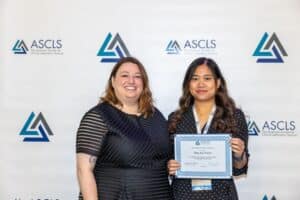The Clinical Laboratory Educators Forum (CLEF) of ASCLS supports an annual competition for undergraduate MLS/DMS/CGT/MLT student research papers and case studies. Student research papers should address scientific as well as applicable educational, technical, administrative, consulting and management studies. Case studies should address any unusual, interesting and unique manifestation of a disease etiology, pathology, clinical syndrome, complications and prognosis known or unknown. Submissions must be original work (not previously published).
Submission deadline: April 1
Research papers and case studies not emailed by April 1 will be rejected without review, and submitters will be notified. Each submission must consist of:
- One signed copy of the ASCLS CLEF Student Paper Award Application
- One copy of the research paper or case study (Word format). Include the research paper or case study title, author name and institution address on the coversheet of the work.
- Both items should be emailed to Melanie Giusti, ASCLS Director of Professional Development & Project Management, at melanieg@ascls.org.
Research paper eligibility: Student must be a current ASCLS member, and must have been enrolled in a NAACLS accredited MLS/DMS/CGT/MLT program at the time the research was conducted.
Research paper award: $500 cash prize and free registration to attend the 2024 Joint Annual Meeting (in-person or virtually)
Case study eligibility: Student must be a current ASCLS member and presently enrolled in a NAACLS-accredited MLS/DMS/CGT/MLT program.
Case study award: $500 cash prize and free registration to attend the 2024 Joint Annual Meeting (in-person or virtually)
Conditions and Guidelines
- Submissions must be of original work and not previously published.
- Research papers and case studies will be judged according to guidelines in the Clinical Laboratory Science instructions to authors. Failure to follow guidelines will result in submission rejection.
- Review of the research papers and case studies will be anonymous. Designated representatives of the CLEF will review works. Reviewers are expected to disqualify themselves if a paper/case is from their institution or there is a conflict of interest. Reviewers should abstain from grading if the subject is outside the reviewers’ areas of expertise. Authors will be notified by mail of awards soon after the review process. Date and time of research paper presentation will be included in the notification letter.
- The student award winners will be recognized during the awards ceremony at the ASCLS Annual Meeting.
- Students also can submit their research papers and case studies to Clinical Laboratory Science to be considered for publication.
Criteria for judging research papers: Research papers will be judged according to guidelines in instructions to authors. Basis of grading scale:
- Overall assessment of the investigation’s applicability and inherent value to MLS practitioners.
- The validity of the author’s conclusion in reference to the hypothesis of problems, statistical findings and their level of significance.
- Organization of the paper.
- Adherence to format in published instructions.
Criteria for grading case studies: Case studies will be judged according to guidelines in instructions to authors.
Basis of evaluating scientific merit:
- Case demonstrates extensive study of the subject (population), a valuable contribution to clinical laboratory professions, allied health education, health care and medicine.
- Case represents uncommon disease condition, outcome of disease, unusual complications, education or management outcome and/or methodology.
- Case study is clearly and thoughtfully organized, ideas well defined and comprehensive.
- Interpretation of the case is presented sufficiently with implications for its relevance for clinical application or valuable contribution to the clinical laboratory science practice and profession.
Format and Presentation
- Writing shows good clarity, broad and precise vocabulary attuned to the scientific discipline and correct grammatical usage.
- Patient history and disease condition and/or new innovative practice are described.
- Main outcome measurements reflect the impact of achieving patient outcomes stated with adequate clarity.
- All aspects of instructions to authors are followed.
Preparation of Copy
- All research papers and case studies must be double-spaced and typed with 1-inch margins on all edges.
- Cover page must be included; no abstract is required for initial submission.
- Recommended typeface is Times New Roman, 12-point.
- Text format is flush left.
- To encourage consistency in style, refer to guidelines in instructions to authors
